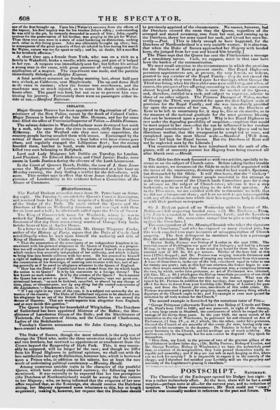The Duke of Sussex, though the most talented, is the
only son of George the Third who, under the three successive reigns of his father and two brothers, has received bo appointment or emolument from the Crown beyond the Rangership of Hyde Park. This, it may reason- ably be supposed, will no longer be the case; and though we differ from his Royal Highness in political opinions, we shall not with the less sotisfaction hail any fit distinction, however late, which is bestowed upon a Prince who, in addition to his talents, has at least the rare merit of undeviating political consistency.—Merning Herald.
Among numerous amiable traits in the character of the youthful Queen, which have already obtained currency, the following may be mentioned. It wits naturally to be expected that her late preceptress (the flinches* of Northumberland) would be among the first miters to her Majesty ; who, on being informed that the etiquette of her new office required that, as the Sovereign, she should receive the Dutcheas sitting, her Majesty expressed some reluctance to this, but at length acquiesced; making it, however, her request that the Dutchess should
be previously apprised of the circumstance. No sooner, however,. had the Dutchess entered the room than the Queen, regardless of the arranged and stated ceremony, rose from her seat, and running up to the Duteliess, threw her arms round her neck, and kissed her most fer. vently.— Post. [This is likely enough to have happened. for the Dutchess of' Northumberland is a very amiable woman. It is also true, that when the Duke of Sussex approached her Majesty with bolded
knee, she jumped from her seat and kissed him heartily.1
The Times says that the Queen has sent the Fitzelarences a message of a consolatory nature. Cash, we suppose, must in that case have been the burden of the communication.
We must recall attention to the circumstances in which the provision for the Dutchess of Kent at present stands. Her Royal Highliess's pecuniary appointments are, at present, the very IMeht, We believe, granted to any member of the Royal Family : they do not exceed the amount at which they were fixed upon her marriage, when George the Third was living, when his three elder sons were still living. and when, of course, the prospect of her offspring succeeding to the throne tt as I emote almost beyond probability. She is now the mother of the Queen; and, therefore, entitled to a rank, and subject to expeuses, itifelior to those of no other subject. The Princess Dowager of Miles, mother of George the Third, was provided for upon the then highest scale of provision for the Royal Family; and she was immediately provided for upon the accession of her son. Now, why is the Dun-hues of Kent to be left in uncertainty for, it may be, five or six months, as to the measure of the national gratitude for the most precious blessing that min be bestowed upon a people? Why is her Royal Highness to rest under the degrading possibility of suspicion—suspicion that would be most unjust in her case—that she can be influenced in her conduct by personal considerations? It is but justice to the Queen and to her
illustrious mother, that this arrangement be completed at once, and completed upon the most liberal scale.— Standard. [Well done, Tories ! bid high for Royal favour. But the Dutchess of Kent will riot be neglected even by the Liberals.]
The reservation which has been introduced into the oath of alle-
giance, will of necessity prevent her Majesty from being crowned till after March next —Herald.


























 Previous page
Previous page